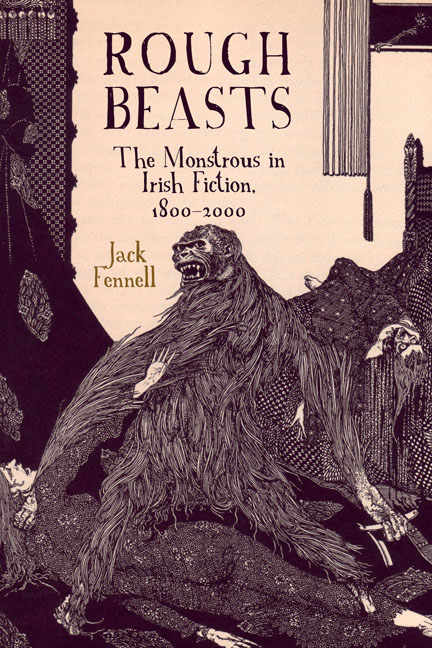Book contents
- Frontmatter
- Contents
- Acknowledgements
- 1 Introduction: In Defence of Fear
- 2 We Dare Not Go A-Hunting: Fairies, Deep Time, and the Irish Weird
- 3 Harbingers of Hunger: Famine, Cannibalism, and Hunger-Demons
- 4 From Lore to Law: Malevolent Magic and Spiritual Warfare
- 5 Ghosts, Narrative, and Noumenal Reality
- 6 Just Sign Here: Faustian Pacts, Demons, and Chaos
- 7 The Undead Generations: Zombies, Vampires, and the Corporeal Undead
- 8 Breeding Breaks Out: Shape-Shifters, Cryptids, and Cunning Animals
- 9 Haunted Spaces and Monstrous Lairs
- 10 Conclusions
- Bibliography
- Index
8 - Breeding Breaks Out: Shape-Shifters, Cryptids, and Cunning Animals
- Frontmatter
- Contents
- Acknowledgements
- 1 Introduction: In Defence of Fear
- 2 We Dare Not Go A-Hunting: Fairies, Deep Time, and the Irish Weird
- 3 Harbingers of Hunger: Famine, Cannibalism, and Hunger-Demons
- 4 From Lore to Law: Malevolent Magic and Spiritual Warfare
- 5 Ghosts, Narrative, and Noumenal Reality
- 6 Just Sign Here: Faustian Pacts, Demons, and Chaos
- 7 The Undead Generations: Zombies, Vampires, and the Corporeal Undead
- 8 Breeding Breaks Out: Shape-Shifters, Cryptids, and Cunning Animals
- 9 Haunted Spaces and Monstrous Lairs
- 10 Conclusions
- Bibliography
- Index
Summary
In May 1777 an advertisement in the Freeman's Journal, addressed to “the Curious in general, but particularly to all Mummers, Mountebanks, Jugglers, Rope-dancers, Fencing masters and Horse-riders”, gave notice that Shane McBreaghagh, along with his assistants Scaramouch, Pantaloon, Fungus, and Barebone, were to open a booth in College Green on the 21st of the month for three days of performances. The show would feature juggling, stand-up comedy, sketch comedy, impersonations, and magic tricks from each member of the company, but the headline act was McBreaghagh himself, “Successor to Stritch, late manager of the puppet-show on Chapel Street”. Among other sleights-ofhand and illusions, McBreaghagh promised “wonderful transmutations”:
In particular, he will transform himself into a Cat, then instantly into a Lion, and suddenly afterwards into a Buck of the first Head; then into a Hare, and Presto begone, into a Philologist, Poet, Historian, Orator and Philosopher.
Underneath, the advertisement warns: “No money to be returned” (“Advertisement to the Curious in general” [Shane McBreaghagh and Company]. Freeman's Journal 17 May 1777), in case the public failed to spot that McBreaghagh's stage name was derived from bréagach, meaning “false”, “counterfeit”, or “spurious”.
Shape-shifters are an ever-present fixture of the human imagination, and their presence in the Irish cultural landscape is attested to in numerous legends – of selkies, werewolves, and shape-changing witches – and a variety of texts, from purported histories of Ireland to Gothic novels and horror literature. The English historian and topographer William Camden, in his 1607 geographical and historical study Britannia, speaks of a higher-than-average number of werewolves in County Tipperary:
Whereas some of the Irish, and such as would be thought worthy of credit, doe affirme that certaine men in this tract are yeerely turned into Wolves, surely I suppose it to be a meere fable, unless happly through that malicious humour of predominant unkind Melancholie they be possessed with the malady that the Phisitians call ƛυκανθρωπία [lycanthropy], which raiseth and engendreth suchlike phantasies as that they imagine themselves to be transformed into Wolves. Neither dare I otherwise affirme of those metamorphised Lycaones in Liveland [Livonia], concerning whom many writers deliver many and mervailous reports. (philological.bham.ac.uk)
- Type
- Chapter
- Information
- Rough BeastsThe Monstrous in Irish Fiction, 1800–</I>2000, pp. 186 - 210Publisher: Liverpool University PressPrint publication year: 2019



